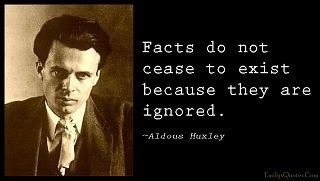Here’s a Prediction of the Future: It Will Remain Unpredictable
Frequent commenter MarcoPolo writes: If you want to accept a doctrine based on faith, that’s okay by me. However, it precludes any objective or realistic analysis. No one can accurately predict the future.
First, no one’s suggesting that taking things on faith is a good idea. Clearly Aldous Huxley didn’t think so, given his famous quote on the subject at the left.
The more interesting aspect of your comment is that it’s true that no one can accurately predict the future, even though that doesn’t mean that all people who make predictions are wrong.
I for one am totally unsure of what’s going to happen with our civilization. The challenges (climate change and other environmental issues, terrorism, weapons of mass destruction, social injustice, etc.) are both severe and numerous, and no one with any sense claims to know where this is going to land.
Having said this, on the environmental front, there are two major forces driving climate change and its associated ocean acidification, desertification, and sea-level rise: Fossil fuel consumption and the raising of animals for the production of meat. Re: fossil fuels, even Shell Oil says that all this is going to be gone by 2060, at which time solar (in any or all of its forms) will have emerged as the source of power for our civilization. So here, the only open question is how much damage will be inflicted during the time required to make this happen. Guess what: No one knows.
In my public speaking, I often make the point that, although I study this stuff probably 70 hours a week, I am entirely on the fence re: the outcome. In other words: I can tell you a lot about the factors in play, but regarding the ultimate outcome: Don’t ask me. To help me make this point, I often recite this charming poem by Allan Ahlberg:
Please Mrs Butler
This boy Derek Drew
Keeps copying my work, Miss.
What shall I do?
Go and sit in the hall, dear.
Go and sit in the sink.
Take your books on the roof, my lamb.
Do whatever you think.
Please Mrs Butler
This boy Derek Drew
Keeps taking my rubber, Miss.
What shall I do?
Keep it in your hand, dear.
Hide it up your vest.
Swallow it if you like, love.
Do what you think best.
Please Mrs Butler
This boy Derek Drew
Keeps calling me rude names, Miss.
What shall I do?
Lock yourself in the cupboard, dear.
Run away to sea.
Do whatever you can, my flower.
But don’t ask me!


Craig,
You wrote “…even Shell Oil says that all this is going to be gone by 2060, at which time solar (in any or all of its forms) will have emerged as the source of power our civilization.”
I think that it’s more likely that nuclear power will emerge as the major, but not only, source of power for our civilization. I expect that hydro power will also be used and that solar power will be used in small remote areas where connecting to the grid will be impractical.
Before we collectively throw up our hands and give up we should take a moment to consider that we actually predict the future all the time.
You go to the hall because you predict that the key for the car is on the hook where you left it the day before. You walk to the driveway where you predict that you will find your car. As you drive the streets you stop at a red light and predict that the person behind you will also stop. When it turns green you predict that the traffic in the opposite direction will stop. It is not always accurate but that does not stop you from ever predicting the future.
But when we use words like “predict” it casts an air of uncertainty … it is the glass-half-empty perspective. We can say that we “expect” or “plan” and sometimes “hope” and we our “predictions” shift to a glass-half-full perspective.
Predictions also seem to improve with practice and experience. You have seen someone drinking coffee or taking some water around a certain time at the office and you predict that you might catch them at the coffee pot or around the water cooler.
When we get enough experience in an area perhaps we can even develop some intuition on the subject and have a leap, not of faith but of predictive ability.”